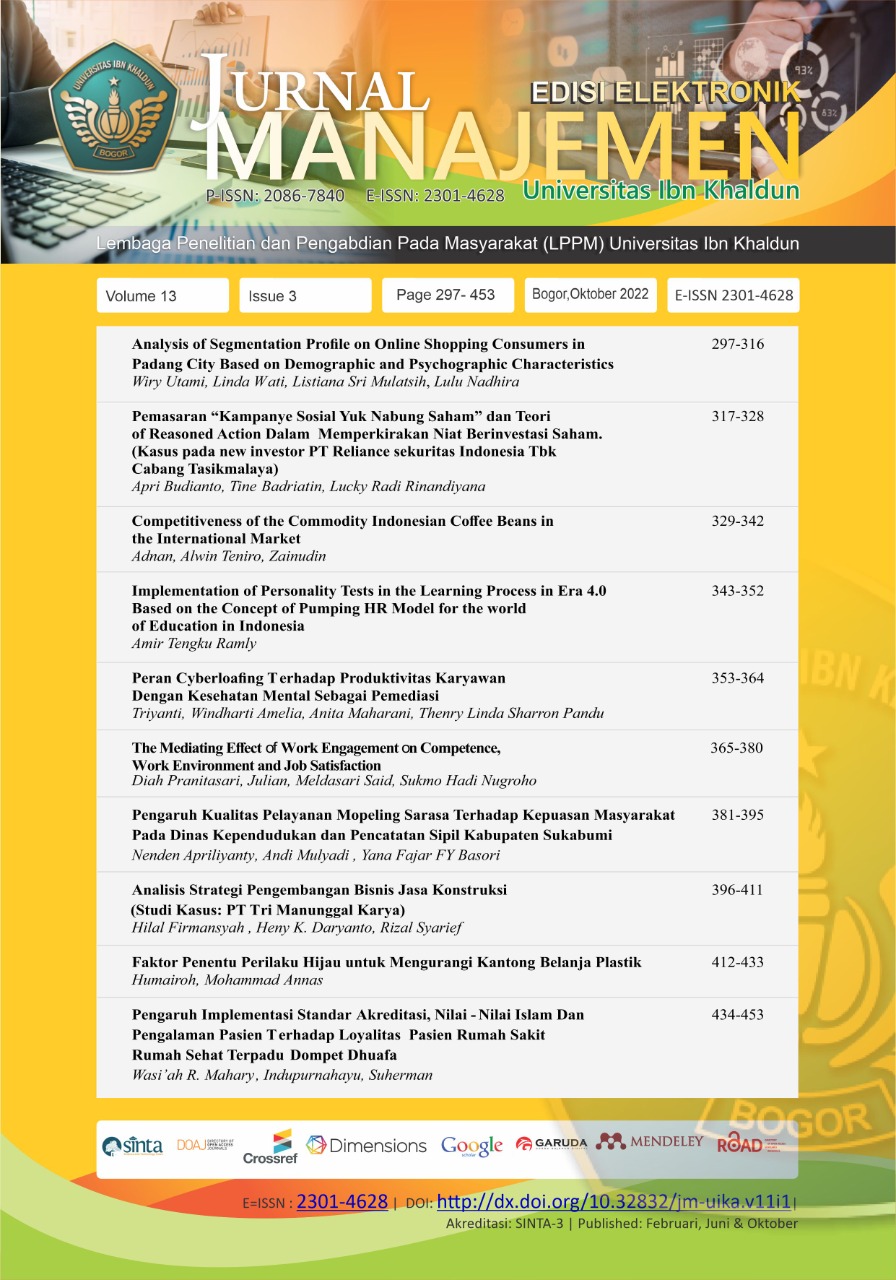Implementation of Personality Tests in the Learning Process in Era 4.0 Based on the Concept of Pumping HR Model for the world of Education in Indonesia
DOI:
https://doi.org/10.32832/jm-uika.v13i3.7135Keywords:
Personality test, pumping-HR model, education, 4.0.Abstract
Understanding the character of learning is one of the important factors for success in learning and in the future. The era of 4.0 and the COVID-19 pandemic today has forced major changes in the teaching and learning system so that it is not disruptive. The learning process in the 4.0 era requires all-digital and effective breakthroughs. This condition is also supported by the COVID-19 pandemic which is predicted not to end soon. This study aims to (1) design a digital student character understanding test tool (2) develop students through a character approach to learning the Pumping HR Model concept, (3) develop teaching-learning techniques based on student character development through strengthening personality, competence and values. - spirituality values. The research method used is a qualitative study of literature and evaluation of the test equipment used for decades. The results of the study indicate that the implementation of personality tests (behavior and character) in the learning process in the 4.0 era greatly determines the effectiveness of the teaching and learning process. This effectiveness is strongly influenced by the implementation of three main components, namely (1) teacher integrity, (2) teacher competence, and (3) teacher personality in teaching, as part of the Pumping-HR Model framework.
References
Anshori, A. (2011). Implementasi pendekatan Pumping Talent dalam mengembangkan kemapuan seni baca Al Qur'an IQMA IAIN Sunan Ampel Surabaya periode 2009-2010 (Doctoral dissertation, UIN Sunan Ampel Surabaya).
Aslan, A. (2017). Pumping Teacher dalam Tantangan Pendidikan Abad 21. Muallimuna, 2(2), 89-100.
Azizah, D. N. R. (2010). Studi korelasi Pumping Talent terhadap prestasi belajar siswa pada mata pelajaran Pendidikan Agama Islam di SMPN 2 Dlanggu, Mojokerto (Doctoral dissertation, IAIN Sunan Ampel Surabaya).
Darmawan, D. (2012). Teknologi pembelajaran. Bandung: PT Remaja Rosdakarya.
Daniel, E., & Warsiah. (2009). Metode Penulisa n Kary a Ilmiah. Bandung: Laboratorium PKn Universitas Pendidikan Pancasila.
Dianti, M., Syahid, A., & Normawati, N. (2019). Penerapan Model Pembelajaran Pumping Student Dalam Meningkatkan Hasil Belajar Pada Mata Pelajaran Pendidikan Agama Islam Di Sekolah Menengah Pertama Negeri 4 Kasimbar. Jurnal Kolaboratif Sains, 2(1).
Ismaniati, C. (2010). Penggunaan teknologi informasi dan komunikasi dalam peningkatan kualitas pembelajaran. Yogyakarta: Universitas Negeri Yogyakarta.
Nasution, M. K. M., Sitepu, R., Siregar, M. G., Syam, B., Sihombing, L., Rambe, A. S., ... & Elfida, M. (2018, December). Talenta. In Journal of Physics: Conference Series (Vol. 1116, No. 2, p. 022033). IOP Publishing.
Nasution, S. O. (2021). Implementasi Model Pembelajaran Quantum Teaching Dalam Meningkatkan Kecakapan Hidup (Life Skill) Pada Mata Pelajaran Fiqih Terhadap Siswa Mts Tut Wuri Handayani Medan. J-PARIS: Jurnal Pendidikan Agama Islam dan Riset, 2(1), 39-52.
Muchtar, D., & Suryani, A. (2019). Pendidikan Karakter Menurut Kemendik-bud. Edumaspul: Jurnal Pendidikan, 3(2), 50-57.
Muijst, D., & Reynolds, D. (2008). Effective teaching. Evidence and practice. London: Sage Publication Ltd London.
Moon, S. M. (2003). Personal talent. High Ability Studies, 14(1), 5-21.
Pratiwi, D. R. (2017). Implementasi Pengajaran Karakter melalui Integrasi Multiliterasi Digital pada Pembelajaran Bahasa Indonesia. Proceedings Universitas Muhammadiyah Surabaya: https://publikasiilmiah.ums.ac.id/xmlui/handle/11617/8907 (dunduh tanggal 26 Oktober 2020
Ramly, A. T. (2021). Learning & Teaching: Paradigma Having & Being Berdasarkan Empat Kuadran Guru dan Keteladanan Rasulullah Sebagai Guru Terbaik. GCAINDO.
Ramly, A. T., & Aminda, R. S. (2020). The Educators Personality Development in Indus-try 4.0 Based on Pumping HR-Model. Integrated Journal of Business and Econom-ics, 4(2), 120-132.
Ramly, A. T., & Suherbi, D. (2020). Personality Type Based Pumping-HR Model Toward Working Targets of The Civil Service. Jurnal Manajemen, 24(1), 109-123.
Ruslan, Rosady. 2008. Metodologi Penelitian Public Relations dan Komunikasi, Jakarta: PT Raja Grafindo Persada.
Saputra, A. R. M. (2021). Pengaruh Model Pumping Student Terhadap Hasil Belajar Al-Qur'an Hadits Siswa Di Mts Pondok Pesantren Salafiyah Hidayatul Qomariyah Kota Bengkulu (Doctoral dissertation, IAIN Bengkulu).
Overby, C., Meringer, J., Ysaguirre, D., Jastrzembski, E., & Dawe, C. (2000). Pumping Up Internal eBusiness Talent. Forrester Report, October.
Wati, I., & Kamila, I. (2019, February). Pentingnya guru professional dalam mendidik siswa milenial untuk menghadapi revolusi 4.0. In Prosiding Seminar Nasional Program Pascasarjana Universitas PGRI Palembang (Vol. 12, No. 01).
Downloads
Published
How to Cite
Issue
Section
License
Authors who publish with this journal agree to the following terms:
- Authors retain copyright and grant the journal right of first publication with the work simultaneously licensed under a Creative Commons Attribution-NonCommercial-ShareAlike 4.0 International License that allows others to share the work with an acknowledgement of the work's authorship and initial publication in this journal.
- Authors can enter into separate, additional contractual arrangements for the non-exclusive distribution of the journal's published version of the work (e.g., post it to an institutional repository or publish it in a book), with an acknowledgement of its initial publication in this journal.
- Authors are permitted and encouraged to post their work online (e.g., in institutional repositories or on their website) prior to and during the submission process, as it can lead to productive exchanges, as well as earlier and greater citation of published work (See The Effect of Open Access).











